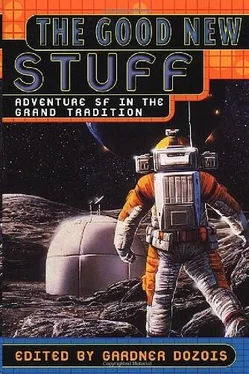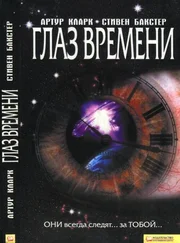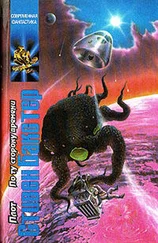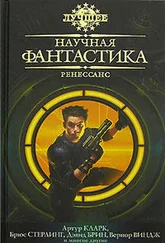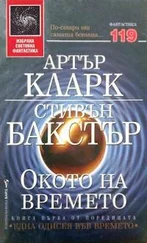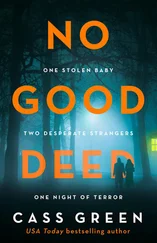Стивен Бакстер - The Good New Stuff
Здесь есть возможность читать онлайн «Стивен Бакстер - The Good New Stuff» весь текст электронной книги совершенно бесплатно (целиком полную версию без сокращений). В некоторых случаях можно слушать аудио, скачать через торрент в формате fb2 и присутствует краткое содержание. Год выпуска: 2002, ISBN: 2002, Издательство: St. Martin's Griffin, Жанр: Фантастика и фэнтези, на английском языке. Описание произведения, (предисловие) а так же отзывы посетителей доступны на портале библиотеки ЛибКат.
- Название:The Good New Stuff
- Автор:
- Издательство:St. Martin's Griffin
- Жанр:
- Год:2002
- ISBN:0-312-26456-9
- Рейтинг книги:3 / 5. Голосов: 1
-
Избранное:Добавить в избранное
- Отзывы:
-
Ваша оценка:
- 60
- 1
- 2
- 3
- 4
- 5
The Good New Stuff: краткое содержание, описание и аннотация
Предлагаем к чтению аннотацию, описание, краткое содержание или предисловие (зависит от того, что написал сам автор книги «The Good New Stuff»). Если вы не нашли необходимую информацию о книге — напишите в комментариях, мы постараемся отыскать её.
The Good New Stuff — читать онлайн бесплатно полную книгу (весь текст) целиком
Ниже представлен текст книги, разбитый по страницам. Система сохранения места последней прочитанной страницы, позволяет с удобством читать онлайн бесплатно книгу «The Good New Stuff», без необходимости каждый раз заново искать на чём Вы остановились. Поставьте закладку, и сможете в любой момент перейти на страницу, на которой закончили чтение.
Интервал:
Закладка:
"Don't think," I said. "Tell Marek Lambrois to come into the street and I will let him live."
This was untrue, of course, but hope never dies, I'd discovered, even in the hardest of soldiers. But perhaps I'd underestimated Marek. Sometimes I still wonder.
He stumbled out, still partly asleep, onto the street. Last night had evidently been a hard and long one. His eyes were a red no detox nano could fully clean up. His skin was the color of paste.
"You have something on me," I said. "I cannot abide that."
"Colonel Bone," he began. "If I'd knowed it was you—"
"Too late for that."
"It's never too late, that's what you taught us all when you turned that offensive around out on the Husk and gave the Chaos the what-for. I'll just be going. I'll take the gang with me. It's to no purpose, our staying now."
"You knew enough yesterday— enough to leave." I felt the rage, the old rage that was to be, once again. "Why did you do that to her?" I asked. "Why did you—"
And then I looked into his eyes and saw it there. The quiet desire— beaten down by synthesized emotions, but now triumphant, sadly triumphant. The desire to finally, finally die.
Marek was not the unthinking brute I'd taken him for after all. Too bad for him.
I took a step toward Marek. His instincts made him reach down, go for the trunch. But it was a useless weapon on me. I don't have myelin sheaths on my nerves. I don't have nerves anymore; I have wiring.
Marek realized this was so almost instantly. He dropped the trunch, then turned and ran. I caught him. He tried to fight, but there was never any question of him beating me. That would be absurd. I'm Colonel Bone of the Skyfalling 8th. I kill so that there might be life.
Nobody beats me. It is my fate, and yours too.
I caught him by the shoulder, and I looped my other arm around his neck and reined him to me— not enough to snap anything. Just enough to calm him down. He was strong, but had no finesse.
Like I said, glims are hard to kill. They're the same as snails in shells in a way, and the trick is to draw them out— way out. Which is what I did with Marek. As I held him physically, I caught hold of him, all of him, over there, in the place I can't tell you about, can't describe. The way you do this is by holding a glim still and causing him great suffering, so that they can't withdraw into the deep places. That's what vampire stakes and Roman crosses are all about.
And, like I told Bex, glims are bad ones, all right. Bad, but not the worst.
I am the worst.
Icicle spike
from the eye of a star.
I've come to kill you.
I sharpened my nails. Then I plunged them into Marek's stomach, through the skin, into the twist of his guts. I reached around there and caught hold of something, a piece of intestine. I pulled it out. This I tied to the porch of the Bexter Hotel.
Marek tried to untie himself and pull away. He was staring at his insides, rolled out, raw and exposed, and thinking— I don't know what. I haven't died. I don't know what it is like to die. He moaned sickly. His hands fumbled uselessly in the grease and phlegm that coated his very own self. There was no undoing the knots I'd tied, no pushing himself back in.
I picked him up, and as he whimpered, I walked down the street with him. His guts trailed out behind us, like a pink ribbon. After I'd gotten about twenty feet, I figured this was all he had in him. I dropped him into the street.
Hemingway was in the northeast and Fitzgerald directly east. They both shone at different angles on Marek's crumple, and cast crazy, mazy shadows down the length of the street.
"Colonel Bone," he said. I was tired of his talking. "Colonel—"
I reached into his mouth, past his gnashing teeth, and pulled out his tongue. He reached for it as I extracted it, so I handed it to him. Blood and drool flowed from his mouth and colored the red ground even redder about him. Then, one by one, I broke his arms and legs, then I broke each of the vertebrae in his backbone, moving up his spinal column with quick pinches. It didn't take long.
This is what I did in the world that people can see. In the twists of other times and spaces, I did similar things, horrible, irrevocable things, to the man. I killed him. I killed him in such a way that he would never come to life again, not in any possible place, not in any possible time. I wiped Marek Lambrois from existence. Thoroughly. And with his death the other glims died, like lights going out, lights ceasing to exist, bulb, filament and all. Or like the quick loss of all sensation after a brain is snuffed out.
Irrevocably gone from this timeline, and that was what mattered. Keeping this possible future uncertain, balanced on the fulcrum of chaos and necessity. Keeping it free, so that I could go back and do my work.
I left Marek lying there, in the main street of Heidel. Others could do the mopping up; that wasn't my job. As I left town, on the way back to my house and my life there, I saw that I wasn't alone in the dawn-lit town. Some had business out at this hour, and they had watched. Others had heard the commotion and come to windows and porches to see what it was. Now they knew. They knew what I was, what I was to be. I walked alone down the road, and found Bex and her father both sound asleep in my room.
I stroked her fine hair. She groaned, turned in her sleep. I pulled my covers up to her chin. Forty years old, and as beautiful as a child. Safe in my bed. Bex. Bex. I will miss you. Always, always, Bex.
I went to the living room, to the shroud-covered furniture. I sat down in what had been my father's chair. I sipped a cup of my father's best barley-malt whiskey. I sat, and as the suns of Ferro rose in the hard-iron sky, I faded into the distant, dying future.
Paul J. McAuley
ALL TOMORROW'S PARTIES
Born in Stroud, England, in 1955, Paul J. McAuley now makes his home in London. A professional biologist for many years, he sold his first story in 1984, and has gone on to be a frequent contributor to Interzone, as well as to markets such as Amazing, The Magazine of Fantasy & Science Fiction, Asimov's Science Fiction, When the Music's Over, and elsewhere.
Like his friend and colleague Stephen Baxter, McAuley has a foot in several different camps of science fiction writing, being considered to be one of the best of the new breed of British writers (although a few Australian writers could be fit in under this heading as well) who are producing that brand of rigorous hard science fiction with updated modern and stylistic sensibilities that is sometimes referred to as "radical hard science fiction," but he also writes Dystopian sociological speculations about the very near future, and he also is one of the major young writers who are producing that revamped and retooled widescreen Space Opera that has sometimes been called the New Baroque Space Opera, reminiscent of the Superscience stories of the thirties taken to an even higher level of intensity and scale (wait a minute! how many feet does he have, anyway?). His first novel, Four Hundred Billion Stars, one of the earliest examples of the New Space Opera, was published in 1988, and won the Philip K. Dick Award. It was followed by sequels, Secret Harmonies and Eternal Light, and by one of the most vivid of the recent spate of Martian novels, Red Dust. With his next novel, Pasquale's Angel, he put yet another foot down in yet another camp, producing an ingenious and gorgeously colored Alternate History where Leonardo di Vinci brings modern technology to Europe centuries before its time. His next novel, 1996's Fairyland, perhaps his best-known novel and perhaps also his best performance to date at novel length, took us to a troubled future Europe thrown into chaos by fractional politics and out-of-control biotechnology, only a few years into the next century; it won the Arthur C. Clarke Award and the John W. Campbell Award. With his next novel project, though, he is plunging back into Space Opera territory, on an even more ambitious scale, with a major new trilogy, Confluence, set ten million years in the future, the first volume of which, Child of the River, has just been published.
Читать дальшеИнтервал:
Закладка:
Похожие книги на «The Good New Stuff»
Представляем Вашему вниманию похожие книги на «The Good New Stuff» списком для выбора. Мы отобрали схожую по названию и смыслу литературу в надежде предоставить читателям больше вариантов отыскать новые, интересные, ещё непрочитанные произведения.
Обсуждение, отзывы о книге «The Good New Stuff» и просто собственные мнения читателей. Оставьте ваши комментарии, напишите, что Вы думаете о произведении, его смысле или главных героях. Укажите что конкретно понравилось, а что нет, и почему Вы так считаете.
